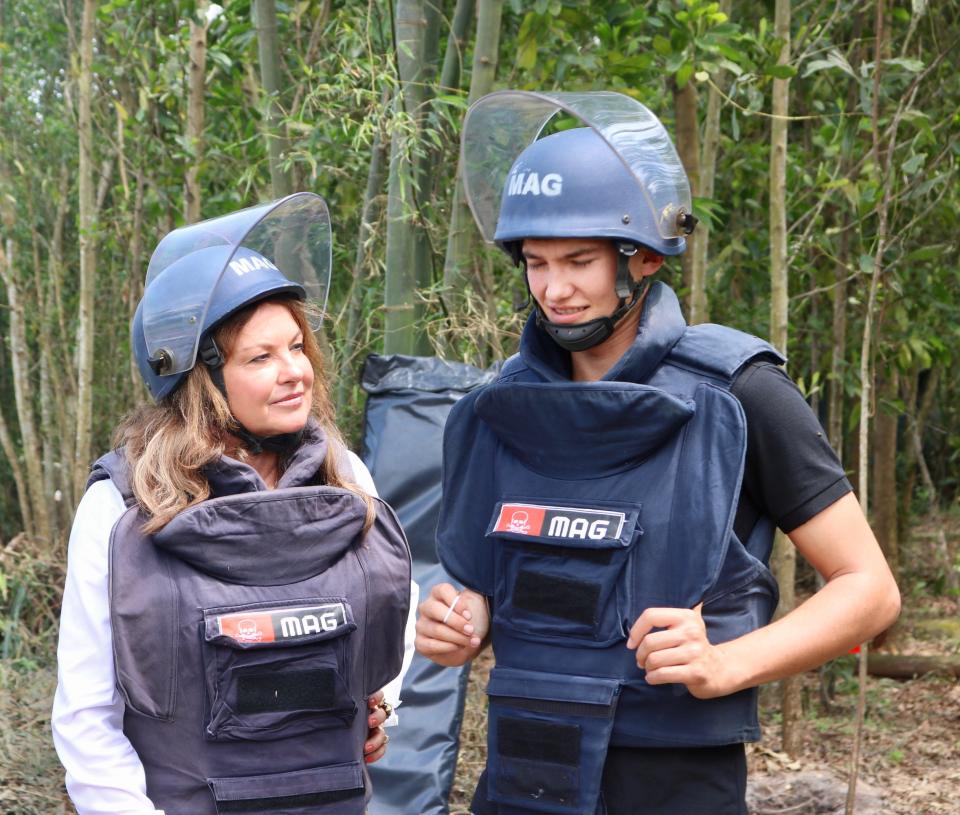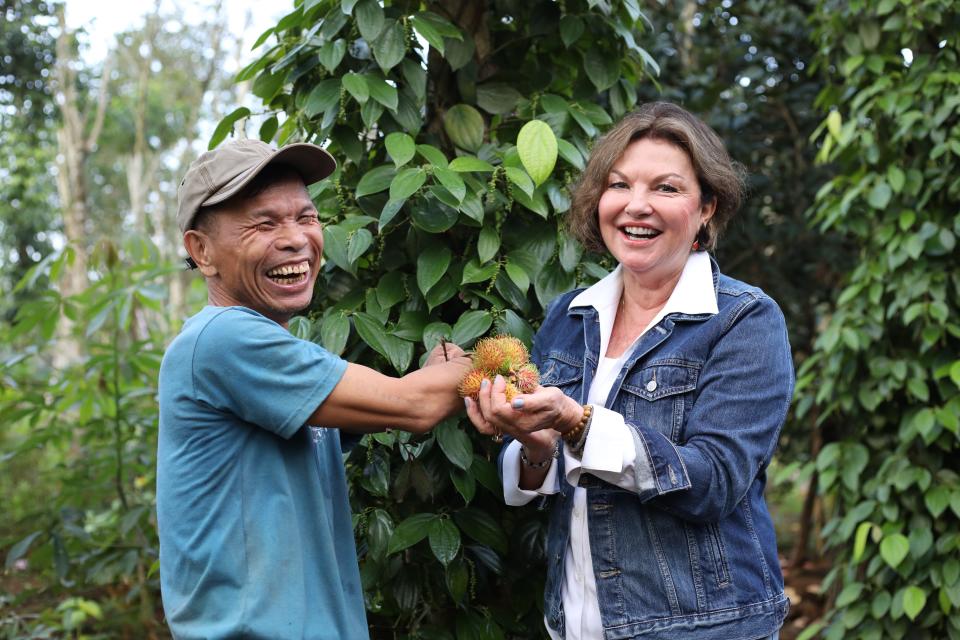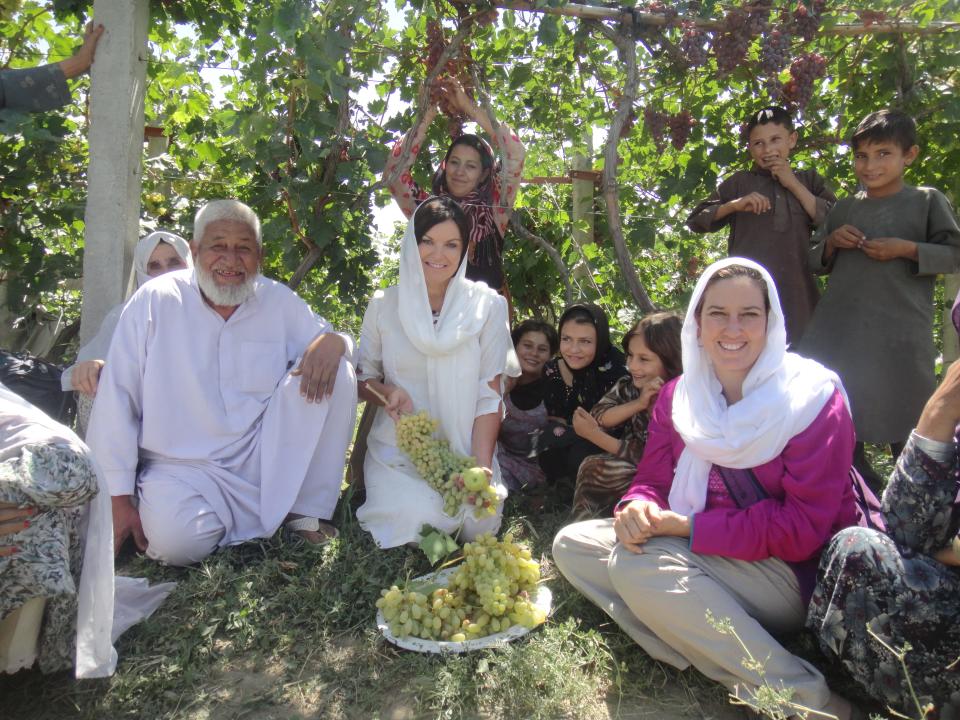Roots of Peace founder wins World Food Prize for reviving farms in former minefields

Heidi Kühn of California, founder of the nonprofit humanitarian group Roots of Peace, has won the Des Moines-based World Food Prize for 2023 in recognition of her work in former battlegrounds including Afghanistan and Vietnam, helping farmers grow fruit, nuts and other crops in fields once filled with landmines.
Kühn has "shown more than a million people living in war-torn regions a way forward to restoring peace and prosperity through agriculture," World Food Prize President Terry Branstad, a former Iowa governor and U.S. ambassador to China, said during a ceremony Thursday at the National Academy of Sciences in Washington, D.C.
Kühn and Roots of Peace work “directly with farmers to restore farmland and food security after devastating conflict,” said Branstad, who was joined in the ceremony by U.S. Secretary of State Antony Blinken and Agriculture Secretary Tom Vilsack, another former Iowa governor.
From 2022: Cynthia Rosenzweig wins World Food Prize for work showing climate change's impact on agriculture
Kühn, who was working at a land mine site in Azerbaijan on Thursday when the announcement was made, told the Des Moines Register earlier this month that she would accept the $250,000 award on behalf of "all the farmers and families who live in conflict-ridden regions."
Blinken said it was appropriate that Kühn was "out doing the work in the field, helping to remove landmines" when the award was announced. Kühn "is turning fields of death into gardens of life," by helping remove more than 100,000 landmines, he said.
"What's so extraordinarily powerful is restoring the land ... to help feed people and create economic opportunity," Blinken said.
Like Norman Borlaug, Heidi Kühn has cultivated 'peace through agriculture'
The World Food Prize Foundation said in a news release Thursday that Kühn’s “farmer-focused development model revitalizes farmland, food security, livelihoods and resilience after devastating conflict.”
Like Norman Borlaug, the Iowa native who founded the World Food Prize, Kühn has cultivated "peace through agriculture," Branstad said in a statement.
Borlaug was awarded the Nobel Peace Prize in 1970 for his research to create drought-resistant, high-yielding wheat varieties. He is credited as the "father of the Green Revolution," who saved a billion people from hunger.
Blinken said addressing food insecurity is key to ensuring global security, and it's part of the reason why the U.S. spent $13.5 billion to provide food assistance worldwide last year.
"We know that today, conflict remains the largest single driver of food insecurity," he said. "The 10 worst crises in the world have all been caused or worsened by conflict. Seventy percent of the hungriest people in the world live in regions that are affected by war, and by violence, and often, even when the violence ends, hunger remains."
Blinken said people like Kühn bring "the spirit of innovation to this work. They bring a spirit of determination to this work, and they are quite literally forging new paths toward progress."
In addition to Afghanistan, Azerbaijan and Vietnam, Kühn’s work over the past 26 years has supported de-mining partners in Angola, Cambodia, Croatia, Iraq, Israel and Palestinian areas, allowing local farmers safe access to irrigation canals and land for cultivation, the foundation said.
It said that in Afghanistan alone, Roots of Peace's work has helped generate exportable crops of cherries, pomegranates, almonds, saffron and other crops worth an estimated $491 million since 2010, supporting rural livelihoods and economic recovery.
$3 to plant a mine; $1,000 to remove it

Kühn, speaking from her Marin County, California, home, told the Register she believes winning the prize will elevate the work of nonprofits like hers that are removing mines and helping rebuild farming communities around the globe.
The United Nations estimates that about 60 million people in almost 70 countries and territories are at peril from minefields, including rural communities where farming is the main source of income.
Roots of Peace works with local residents to reclaim land after groups like England's Mines Advisory Group and Scotland’s Halo Trust have first removed mines. The process is expensive and time-intensive, Kühn said.
Previously: USAID administrator says climate change is major force behind global food crisis
“It costs about $3 to put in a mine and about $1,000 to remove it,” she said.
It also can be dangerous, and not just because of the mines. In 2014, Taliban militants attacked a building housing Roots of Peace workers in Afghanistan.
Kühn, an author and former journalist, said work is still underway to remove mines in countries like Vietnam, Laos and Cambodia, nearly five decades after the Vietnam War ended. About 100,000 Vietnamese have been killed or maimed by landmines, "the remnants of war," she said.
Vilsack said Vietnam's prime minister told him during a recent trade mission that the U.S. needs to continue partnering to remove mines from the nation's farmland. "Heidi's work is obviously incredibly important and ongoing. Tragically," Vilsack said.
Kühn said she plans to use the award's cash prize, often referred to as the Nobel Prize of agriculture, to challenge Google, Facebook and other Silicon Valley tech leaders to donate to efforts to remove mines in embattled Ukraine. Partnering with the Rotary Club of Ukraine, Roots of Peace has raised about $170,000 for the effort so far.
“Once the breadbasket of Europe, the Ukraine is now riddled with land mines,” Kühn said, noting that about 30% of the country has been planted with mines amid its invasion by Russia.
Explosives in the Ukraine are complicating spring planting in the country, which has historically supplied about 10% of the world’s wheat, 15% of its corn, 13% of its barley and about half of its sunflower oil. One farmer outfitted a remote-controlled tractor with steel stripped from a Russian tank to de-mine his field, Reuters reported, and Kühn said other farmers are taking similar approaches in an effort to make farmland safe to plant.
“As global citizens, we watch in horror as these insidious land mines are being planted,” said Kühn, who founded Roots of Peace in 1997 with a mission to replace "mines with vines" after surviving a battle with cancer.
Blinken said Russia's invasion of the Ukraine is impacting food security across the globe, given other countries' reliance on the country's food production.
"The Kremlin has tried to leverage food as a weapon in its aggression against Ukraine," he said, adding that the U.S.-supported Black Sea Grain Initiative, brokered by the United Nations and Turkey, has enabled 29 million metric tons of food to move from the Ukraine to "people who desperately need it."
Work started in Croatia's vineyards

Kühn, 65, initially worked with leading vintners from her native California to restore grape production to de-mined land. The mother of four began her work in Croatia after the 1990s Balkan Wars, partnering with Croatian-American wine producer Mike Grgich of Grgich Hills Estate in California's Napa Valley. With Grgich’s support, Kühn helped reestablish the country's millennia-old vineyards.
In the Vietnamese provinces that saw the heaviest bombardment during the war there, Kühn partnered with the U.S. State Department and the Mines Advisory Group to clear mines from densely populated farmland to make way for roughly 1.6 million black pepper trees.
Since 2010, more than 3,500 farmers have benefited from that work, exporting more than 50 metric tons of high-grade black pepper to new markets in the U.S. and expanding into vanilla and cashew production, the World Food Prize Foundation says.
Late World Food Prize benefactor: John Ruan III remembered by friends as quiet and savvy business executive who shaped Des Moines
Kühn said California-based Morton & Bassett Spices buys pepper from the farmers with whom Roots of Peace partners.
"We have to create a business model for peace. We have to make it profitable," Kühn said.
Kühn said Roots of Peace received $30 million from the U.S. Agency for International Development to help boost Afghanistan's agricultural exports. She later used her close relationship with the country's farmers to support efforts to eradicate polio, offering rural families chickens or beehives as encouragement to receive vaccines, the World Food Prize Foundation said.
"You have to respect the cultures you work in" even when customs and laws, such as Taliban's prohibition on women's education, are objectionable, Kühn said.
"We don't serve a flag," she said. "We serve the farmer."
Helping Afghan farmers grow grapes, pomegranates, apples, almonds, apricots and melons reduces their reliance on growing poppies, which are used to make opium and other drugs, she said.
Prize to be presented in October in Des Moines
Kühn credits the late Princess Diana, who led a worldwide campaign to ban land mines, for inspiring her to begin work to rebuild farming in regions where mines have been cleared. Before funding Roots of Peace, Kühn had a career in journalism, reporting from Juneau, Alaska, for ABC News among others. Her book "Breaking Ground" was published in 2020.
Kühn will receive the prize at a ceremony in the Iowa Capitol during the annual Norman E. Borlaug International Symposium, scheduled for Oct. 24-26 in Des Moines.
"With conflicts proliferating in so many parts of the world, nations are increasingly finding it necessary to confront the daunting challenge of rebuilding food systems, livelihoods and communities after conflict," Gebisa Ejeta, 2009 World Food Prize Laureate and chair of the World Food Prize selection committee, said in a statement.
"Heidi Kühn’s work shows the world the vital role agriculture must have in the resilient recovery from conflict and restoration of peace," Ejeta said.
Donnelle Eller covers agriculture, the environment and energy for the Register. Reach her at deller@registermedia.com or 515-284-8457.
This article originally appeared on Des Moines Register: Heidi Kühn wins World Food Prize for replacing minefields with farms
